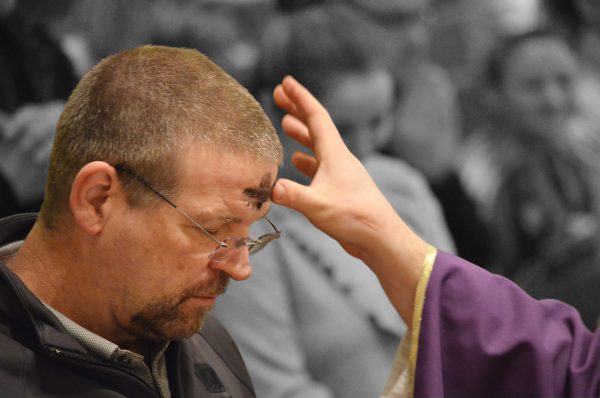Lent, the beginning of our Paschal journey
Randy Phelps, a member of St. Francis of Assisi Parish, Wichita, receives ashes during a Mass at the Cathedral of the Immaculate Conception in Wichita. (Advance file photo)
Lenten fasting observance
Ash Wednesday, Feb. 26, and Good Friday, April 10, are obligatory days of fasting and abstinence for Catholics. Also, Fridays during Lent are obligatory days of abstinence. For members of the Latin Catholic Church, the norms on fasting are obligatory from age 18 until age 59. When fasting, a person is permitted to eat one full meal, as well as two smaller meals that together are not equal to a full meal. The norms concerning abstinence from meat are binding upon members of the Latin Catholic Church from age 14 onwards.
Remember, thou art dust…
Every year, for nearly two millennia, throngs of Catholics lined up to repeat the ancient practice of receiving ashes on the first Wednesday of Lent.
Early church penitents dressed in sackcloth and were sprinkled with ashes on the day after Shrove Tuesday, but that practice evolved after the 10th century to customs more familiar today.
Despite the evolution of the practice over the centuries, the spiritual connection to Ash Wednesday among the faithful has persevered. It is as strong as the words used when receiving ashes: “Remember that you are dust, and unto dust you shall return.”
Fr. Groeschel’s favorite Lenten joke
It is so strong that the late Franciscan Father Benedict Groeschel often shared a story about a Jewish woman who attended an Ash Wednesday service at a New York City Catholic church. “Why?” he asked her. She replied: “It’s free – and it can’t hoit.” Father Groeschel added that Muslims, Hindus, Buddhists, and agnostics lined up for ashes with the same New York logic as their reason.
Father David Voss, chaplain of St. Pius X Catholic Student Center in Pittsburg, said it might appear that people like Ash Wednesday because it’s one of the few days you get something at church.
“That something happens to be ashes – like coal at Christmas, not always the best gift,” he said.
“You hear, ‘remember you are dust, and to dust you shall return,’ another incredibly ‘uplifting’ line,” the chaplain said, adding, so, why do the faithful seem to be drawn to the Ash Wednesday liturgy?
“We know something so deeply in our hearts that we don’t even know that we know it, but we know that we need it. What is that something that we don’t know we know? There’s something more in life, and we’re not there yet.”
Catholic love their ashes
Father Samuel Brand, the pastor of Sacred Heart Parish in Arkansas City, said it’s no secret that Catholics love their symbols.
“They reflect an interior truth and assist us in striving for holiness,” he said. “I think one of the reasons we love getting ashes is so that we can see other people with ashes. For one day, we clearly see solidarity and support that sometimes stays hidden through the rest of the year.”
He said people you work with every day and even fellow parishioners might surprise you. “We are visibly reminded that we are part of a whole. By this show of force, we are strengthened in our determination for good.”
Father Jorge Lopez, parochial vicar at Our Lady of Lourdes Parish in Pittsburg, said he believes the faithful have a strong connection to Ash Wednesday because it’s a reminder that earthly life is temporary. “The imposition of ashes reminds us that our life on earth is transitory and that our final life is in heaven,” he said. “As Catholics, the ashes on our forehead remind us of the weak and finite condition of the human person – who walks towards death.”
The words used for the imposition not only remind us of our mortality, Fr. Lopez said, they also remind us that we are called to “repent, and believe in the Gospel.”
In addition, he said, for Catholics, Ash Wednesday marks a special time in their spiritual lives. “During this time, many of us Catholics intentionally lead our lives to a deeper prayer and fervent supplication for the Lord to come to our aid.”

